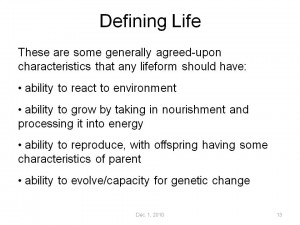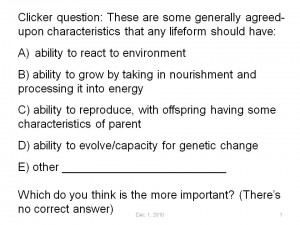In the #astro101 class I’m working on, we just reached the “what is life” section. Great timing, considering the new @NASA astrobiology discovery of a bacteria that, unlike every other living creature, uses arsenic instead of phosphorus in its DNA.
We were going to have a PPT slide that listed 4 “generally agreed-upon” characteristics of life

Four "generally agreed-upon" characteristics of "life". Kind of a boring PPT slide for such an intersting topic, no?
<Yawn> I suggested to the course instructor we switch it into a #clicker question, to get the students to critically think about each characteristic and then compare them to what they think “life” means:

The same content posed as a clicker question to, er, lure the students into thinking about each characteristic.
I intentionally added the last choice “E) other ______” so students could add their own ideas. The instructor and I talked about it ahead of time, and agreed that if students chose E), we’d invite them to share their ideas with the class.
Fast forward to class. We pose the question, not as a think-pair-share sequence but just inviting them to discuss it with their neighbours. Then the students voted.
Excellent – 4 others. Wonder what they are?
“What other characteristics should a life form have?”
Then the shocker. From the back of the room comes
“God!”
In hindsight, we should have expected that! But we weren’t prepared for it. Kudos to the instructor, though: without even a pause, she replied, “Well, we’re not going to add religion and philosophy to this science class. Okay, let’s see how these 4 characteristic apply…”
The student’s answer was a great one. It told us he’d thought about the question we posed and compared it to his own knowledge, experience and beliefs. Who could ask for anything more? Be warned, though: if you want to invite your students to bring their religion into your astronomy class, be prepared – you can’t just wing it. (I did that once. Big mistake. Made me look pretty – no, make that very – ignorant.) And if you’re not familiar with the spectrum of religious beliefs in your classroom, you might want to reconsider the conversation before you start it. Why not be up front about it with your students:
Whenever people talk about the origin of life, some will undoubtedly want to include their religious beliefs. In this class, though, we’re going to stick to the scientific aspects of the discussion, the aspects that can be predicted, observed, proved or disproved by the scientific method. Now, about those scientific characteristics of life…


I think the student misunderstood the question. Your points are characteristics for defining life, not prerequisites for life’s existence or how it originated. So, theoretically, if something existed that met criteria A through D, and yet could somehow be demonstrated not to involve or require any sort of god (even if other organisms somehow could be shown to involve a god or gods!), would this student say that the first, non-godly organism wasn’t alive?
Never mind the problems of how you might demonstrate or refute supernatural involvement. This wasn’t even a question about the origin of life, simply what distinguishes life from non-life. So I don’t think “God” would be a proper answer to E even for a religious person, particularly since if someone believes in a creator deity, that being would be responsible for, and thus a requirement for, the existence of anything and everything you could ever ask a question about–which doesn’t help distinguish anything.
These are excellent points, Derek, and poke at the nature of science. I wish it weren’t the case, but without a determined and on-going effort to talk about science and pseudoscience, we’re often unprepared (and unwilling) to open up a discussion about religion. If we really feel we should be striving to make our students more science-literate, we really should spent more time on it. But, to reiterate, we can’t initiate the discussion without being prepared.